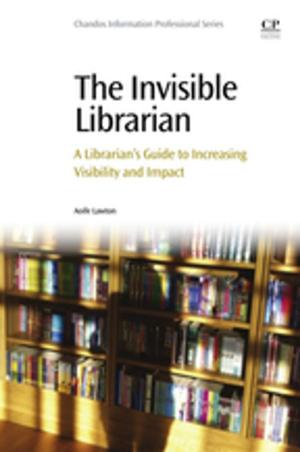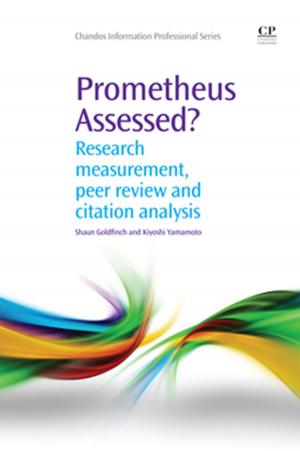Supporting Research in Area Studies
A Guide for Academic Libraries
Nonfiction, Computers, Application Software, Business Software, General Computing, Social & Cultural Studies, Social Science| Author: | Lesley Pitman | ISBN: | 9781780634715 |
| Publisher: | Elsevier Science | Publication: | August 21, 2015 |
| Imprint: | Chandos Publishing | Language: | English |
| Author: | Lesley Pitman |
| ISBN: | 9781780634715 |
| Publisher: | Elsevier Science |
| Publication: | August 21, 2015 |
| Imprint: | Chandos Publishing |
| Language: | English |
Supporting Research in Area Studies: A Guide for Academic Libraries focuses on the study of other countries or regions of the world, crossing traditional disciplinary boundaries in the humanities and social sciences. The book provides a comprehensive guide for academic libraries supporting communities of researchers, exploring the specialist requirements of these researchers in information resources, resource discovery tools, information skills, and the challenges of working with materials in multiple languages.
The book makes the case that adapting systems and procedures to meet these needs will help academic libraries be better placed to support their institutions’ international agenda. Early chapters cover the academic landscape, its history, area studies, librarianship, and acquisitions. Subsequent chapters discuss collections management, digital products, and the digital humanities, and their role in academic projects, with final sections exploring information skills and the various disciplinary skills that facilitate the needs of researchers during their careers.
- Describes the nature of area studies research and the traditional strengths of area studies librarianship in supporting inter- and trans-disciplinary research
- Applies the latest thinking in research support in university libraries to the specific needs of the area studies research community in the United Kingdom and United States
- Explores how internationalizing systems and processes can bring broader benefits to the university as a whole
- Analyzes the particular issues caused by working with content and systems in multiple languages
Supporting Research in Area Studies: A Guide for Academic Libraries focuses on the study of other countries or regions of the world, crossing traditional disciplinary boundaries in the humanities and social sciences. The book provides a comprehensive guide for academic libraries supporting communities of researchers, exploring the specialist requirements of these researchers in information resources, resource discovery tools, information skills, and the challenges of working with materials in multiple languages.
The book makes the case that adapting systems and procedures to meet these needs will help academic libraries be better placed to support their institutions’ international agenda. Early chapters cover the academic landscape, its history, area studies, librarianship, and acquisitions. Subsequent chapters discuss collections management, digital products, and the digital humanities, and their role in academic projects, with final sections exploring information skills and the various disciplinary skills that facilitate the needs of researchers during their careers.
- Describes the nature of area studies research and the traditional strengths of area studies librarianship in supporting inter- and trans-disciplinary research
- Applies the latest thinking in research support in university libraries to the specific needs of the area studies research community in the United Kingdom and United States
- Explores how internationalizing systems and processes can bring broader benefits to the university as a whole
- Analyzes the particular issues caused by working with content and systems in multiple languages















